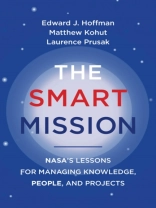Why human skills and expertise, not technical tools, are what make projects succeed.The project is the basic unit of work in many industries. Software applications, antiviral vaccines, launch-ready spacecraft: all were produced by a team and managed as a project. Project management emphasizes control, processes, and tools-but, according to The Smart Mission, that is not the right way to run a project. Human skills and expertise, not technical tools, are what make projects successful. Projects run on knowledge. This paradigm-shifting book-by three project management experts, all of whom have decades of experience at NASA and elsewhere-challenges the conventional wisdom on project management, focusing on the human dimension: learning, collaboration, teaming, communication, and culture.The authors emphasize three themes: projects are fundamentally about how teams work and learn together to get things done; the local level-not an organization’s upper levels-is where the action happens; and projects don’t operate in a vacuum but exist within organizations that are responsible to stakeholders. Drawing on examples and case studies from NASA and other organizations, the authors identify three project models-micro, macro, and global-and their different knowledge needs. Successful organizations have a knowledge-based culture. Successful project management guides the interplay of knowledge, projects, and people.
Edward J. Hoffman & Matthew Kohut
Smart Mission [PDF ebook]
NASA’s Lessons for Managing Knowledge, People, and Projects
Smart Mission [PDF ebook]
NASA’s Lessons for Managing Knowledge, People, and Projects
购买此电子书可免费获赠一本!
语言 英语 ● 格式 PDF ● 网页 176 ● ISBN 9780262369558 ● 出版者 The MIT Press ● 发布时间 2022 ● 下载 3 时 ● 货币 EUR ● ID 8747209 ● 复制保护 Adobe DRM
需要具备DRM功能的电子书阅读器












